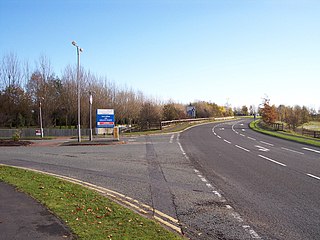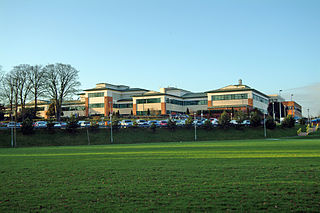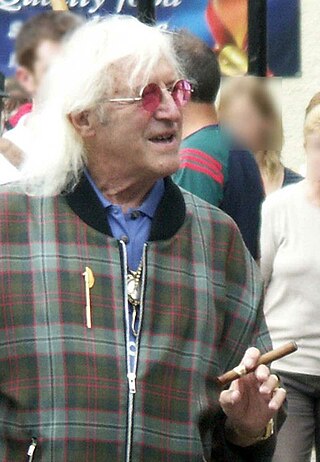Related Research Articles

Broadmoor Hospital is a high-security psychiatric hospital in Crowthorne, Berkshire, England.

Ashworth Hospital is a high-security psychiatric hospital in Maghull, 10 miles (16 km) northeast of Liverpool. It is a part of Mersey Care NHS Foundation Trust, catering to patients with psychiatric health needs that require treatment in conditions of high security.

Furness General Hospital (FGH) is a hospital located in the Hawcoat area of Barrow-in-Furness, Cumbria, England. It is managed by the University Hospitals of Morecambe Bay NHS Foundation Trust.
James Stuart Jones is a retired Church of England bishop. He was the Bishop of Liverpool between 1998 and 2013.

Basingstoke and North Hampshire Hospital (BNHH) is a 450-bed National Health Service (NHS) hospital in Basingstoke, Hampshire, England run by Hampshire Hospitals NHS Foundation Trust. It employs around 2,800 staff. Each year it has around 47,000 admissions, sees 43,000 patients in the Emergency Department, sees around 175,000 outpatients and delivers over 2,800 babies.

Criticism of the National Health Service (England) includes issues such as access, waiting lists, healthcare coverage, and various scandals. The National Health Service (NHS) is the publicly funded health care system of England, created under the National Health Service Act 1946 by the post-war Labour government of Clement Attlee. It has come under much criticism, especially during the early 2000s, due to outbreaks of antibiotic resistant infections such as MRSA and Clostridioides difficile infection, waiting lists, and medical scandals such as the Alder Hey organs scandal. However, the involvement of the NHS in scandals extends back many years, including over the provision of mental health care in the 1970s and 1980s (ultimately part of the reason for the Mental Health Act 1983), and overspends on hospital newbuilds, including Guy's Hospital Phase III in London in 1985, the cost of which shot up from £29 million to £152 million.

The Stafford Hospital scandal concerns poor care and high mortality rates amongst patients at the Stafford Hospital, Stafford, England, during the first decade of the 21st century. The hospital was run by the Mid Staffordshire NHS Foundation Trust, and supervised by the West Midlands Strategic Health Authority. It has been renamed County Hospital. The scandal also resulted in the resignation of NHS Chief Sir David Nicholson in 2013.

The Mid Staffordshire NHS Foundation Trust was a NHS foundation trust which managed two hospitals in Staffordshire, England:

Stephen Anthony Christopher Lloyd is a British Liberal Democrat politician who was twice Member of Parliament (MP) for the seat of Eastbourne.

County Hospital is an acute hospital with less than 200 inpatient beds, opened in 1983. It is the main hospital in Stafford, England. The hospital is managed by University Hospitals of North Midlands NHS Trust. County Hospital's Accident and Emergency unit is the only such facility in Stafford. Wards at County Hospital are numbered, with the exception of specialist units. The hospital changed its name on 1 November 2014 from Stafford Hospital to County Hospital as part of the dissolution of the Mid Staffordshire NHS Trust.

Daniel John Morgan was a British private investigator who was murdered with an axe in a pub car park in Sydenham, London, in 1987. Despite several Metropolitan Police investigations, arrests, and trial, the crime remains unsolved. An independent review into the handling of the investigation of Morgan's killing was published in 2021; it found that the Met Police had "a form of institutional corruption" which had concealed or denied failings in the case.

The Furness General Hospital scandal involves an investigation by Cumbria Constabulary and other government and public bodies into the deaths of several mothers and newborn babies, during the 2000s at Furness General Hospital (FGH) in Barrow-in-Furness, Cumbria, England. Cases date back to 2004, with a number of major incidents occurring in 2008. The death of Joshua Titcombe and a suppressed report by the Morecambe Bay NHS Trust brought the spotlight onto FGH in 2011 when investigations began. Claims of medical records being intentionally destroyed alongside the discovery of major wrongdoing on behalf of midwives led to threats of closure to the maternity ward.

In late 2012, it emerged that Jimmy Savile, a British media personality who had died the previous year, had sexually abused hundreds of people throughout his life, mostly children but some as old as 75, and mostly female. He had been well known in the United Kingdom for his eccentric image and was generally respected for his charitable work, which associated him with the British monarchy and other individuals of personal power.

Kathryn Felice Lampard, Baroness Lampard, is an English politician and former barrister.
Shrewsbury and Telford Hospital NHS Trust is the main provider of hospital services for Shropshire, Telford and Wrekin and North Powys. It runs the Royal Shrewsbury Hospital, the Princess Royal Hospital in Telford, Oswestry Maternity Unit, and Wrekin Community Clinic, Euston House, Telford, in Shropshire, England. It is one of a small number of English NHS Trusts which takes patients from over the border in Wales.
Southern Health NHS Foundation Trust is a former NHS foundation trust which provided community health, mental health and learning disability services across Hampshire. It was one of the largest providers of such services in England. On 1 October 2024, the trust combined with Solent NHS Trust and Isle of Wight NHS Trust to form one large Hampshire and Isle of Wight Healthcare NHS Foundation Trust.

West Suffolk Hospital is a small district general hospital in Bury St Edmunds, England. It is managed by the West Suffolk NHS Foundation Trust.
Sir Robert Anthony Francis KC is a British barrister. He specialises in medical law, including medical and mental health treatment and capacity issues, clinical negligence and professional discipline. He has appeared as a barrister for and chaired several high-profile inquiries into medical controversies/scandals.

Kate Blackwell KC is a British barrister. Head of Chambers at Lincoln House Chambers in Manchester, she became a Crown Court Recorder in 2009 and Queen's Counsel in 2012. Blackwell has been described by The Guardian as a ‘no-nonsense prosecutor’.

Gosport War Memorial Hospital is a hospital in Gosport, Hampshire, England, part of the Southern Health NHS Foundation Trust.
References
- 1 2 "Police investigation announced into Gosport War Memorial hospital deaths". ITV NEWS. 30 April 2019. Retrieved 30 April 2019.
- ↑ "Gosport Independent Panel – Terms of Reference". The Panel Report. Gosport Independent Panel. Retrieved 30 April 2019.
- ↑ "'Disregard for human life' - 450 patients killed by painkillers at hospital, report says". Health Service Journal. 20 June 2018. Retrieved 2 September 2018.
- ↑ Boseley, Sarah (20 June 2018). "Gosport hospital: more than 450 patients died due to opioid drugs policy". The Guardian . Retrieved 20 June 2018.
- 1 2 "Foreword by The Right Reverend James Jones KBE". The Panel Report. Gosport Independent Panel. Retrieved 20 June 2018.
- ↑ Matthews-King, Alex (20 June 2018). "Gosport inquiry: GP 'responsible' for practice of lethal opiate prescribing which may have killed up to 650 patients at NHS hospital, inquiry finds". The Independent . Retrieved 2 July 2018.
- ↑ "Hunderte Briten wegen unnötiger Opioide gestorben". Der Tagesspiegel . 20 June 2018. Retrieved 2 July 2018.
- 1 2 3 Calver, David Brown and Tom (29 June 2018). "Gosport: The numbers behind the scandal". BBC.
- ↑ "NHS 'blame culture' must end, says Hunt". BBC. 21 June 2018. Retrieved 30 October 2019.
- ↑ "Gosport hospital deaths: Evidence 'strong enough to bring charges'". BBC News. 20 January 2019.
- ↑ "BBC One - Panorama, Killed in Hospital". BBC. Retrieved 25 June 2019.
- ↑ Matthews-King, Alex (21 January 2019). "Evidence in Gosport hospital scandal was sufficient for prosecutions 14 years ago, detective says". The Independent.
- ↑ "'New criminal investigation launched into deaths of hundreds of patients at Gosport War Memorial Hospital'". BBC News. 30 April 2019.